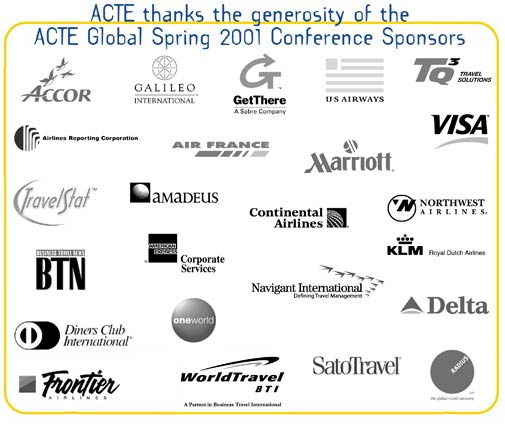 |
Earl
Foster
Chair
ACTE |
ACTE
XIII:
Raising the Bar and Expectations
by Earl Foster |
page
1 >
page 2
The most popular
educational presentation, for the second year in a row, was strategic
sourcing. Now that the concept has been fully explored and embraced, it's
being developed to its maximum potential. To those who claim that the
travel management function has reached its limits, I point to strategic
sourcing. The result of new business models, strategic sourcing is an
example of how the travel management profession continues to evolve within
itself. A new concept five years ago, it's a "best practice" now. Travel
management and strategic sourcing bring the best talents together to enhance
the process.
One of the big surprises of this year's conference was the economy, which
provided a background mutter throughout the crowd. ACTE's leadership couldn't
help but ask itself, "How will the economy affect conference attendance?
Will it cut down on European participation? Will it cast a pall over the
plans for the industry's future growth?" The answers were equally surprising.
This year's conference attendance was up by 10 percent over last year,
with more than 1,100 registrants. Of these, 48 percent were corporate.
Not only was conference attendance up, ACTE XIII also produced one of
the highest corporate-to-vendor participation ratios in the business travel
management industry! European participation remained strong at 15 percent.
If the economy was a factor, then it was a positive one.
It can't be denied that the economy was a major networking topic. Travel
managers wanted to know what steps colleagues were taking in travel cutbacks
and cost containment. The general analysis was all very positive. The
purpose of effective travel policies is to eliminate unnecessary travel.
Companies have been attempting to cut back on travel whenever its cost
goes up and the price of alternatives comes down. An economy in a downswing
just puts a stronger emphasis on the process. The objective of the travel
manager is to provide the right programs for the appropriate economy.
Tough times call for travel managers to be creative. This conference was
all about getting creative and poised for a new period of corporate growth.
ACTE XIII's Technology Experience was still a crowd pleaser and the most
popular event of the conference. Registrants surged through the exhibits,
kicking the tires and getting hands-on demonstrations of how things worked.
The new consensus is that systems are becoming more user-friendly, more
traveler-oriented, and easier to integrate into a corporate system. This
will go a long way in eliminating the technology paralysis faced by some
companies.
The best way to judge the success of a conference is to listen to the
background noise... The comments at lunch… The dialogues in between seminars.
All I heard was the sound of people working to change the future. Nearly
everyone had taken Greeley Koch's advice to leave their opinions at home
and to pack only ideas earmarked for exchange.
These were some of the remarks I heard:
"I'm glad we reached consensus on that point so early in the discussion.
We were then able to move on to translating the data."
"Three days and almost no commercial messages."
"I wish my boss had seen this."
"The speech was better than the food at lunch today."
"I really enjoyed this."
And...
"This was one of the best conferences I've attended in a long career."
(I said this.)
While all of these comments are gratifying to me as a long-standing officer
of this organization, the comment I like to hear the most is,
"I really got a lot out of this year's conference."
And that was the comment I heard most often.
One of the benefits of being part of an industry that changes daily and
offers new wonders on a regular basis, is that when you are surprised,
you're really surprised. The ACTE XIII Global Spring Conference has not
only raised the bar (and expectations) for future ACTE conferences, but
for the industry as well.
Return
to ACTE XIII Tampa Highlights Page

|
|
